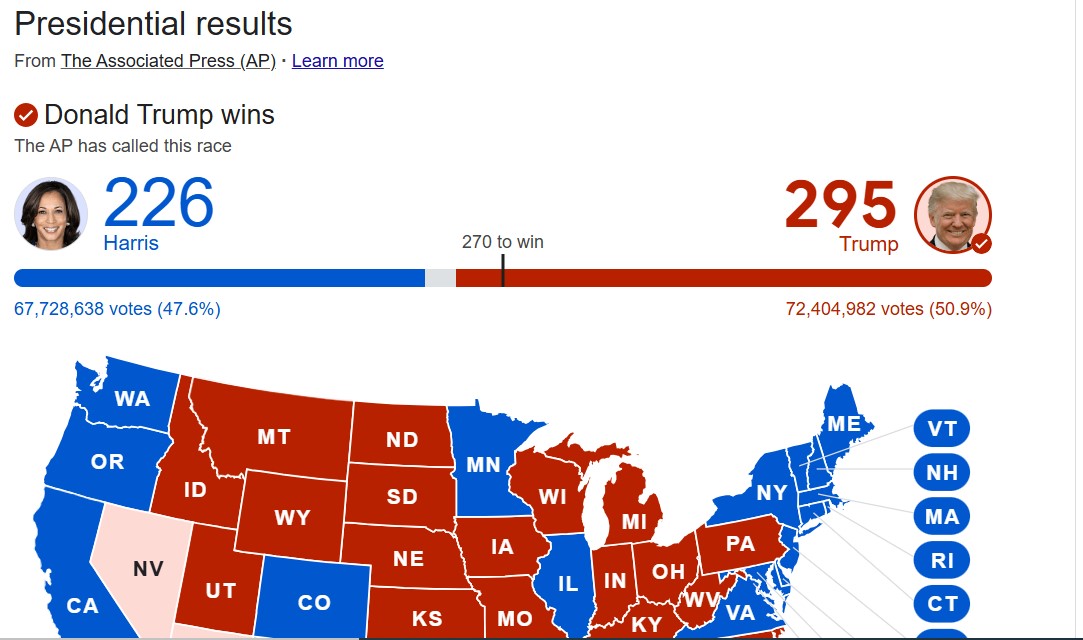As the United States concludes its 2024 presidential election, former President Donald J. Trump has emerged victorious, marking an unprecedented return to the White House. This outcome signals a highly impactful moment in American politics, with extensive implications for domestic and international policy. In this article, we explore the key factors that led to Trump’s success in the 2024 election, analyzing the strategies, voter demographics, campaign messages, and policy stances that helped secure his historic win. We also discuss how Trump’s victory reshapes the future political landscape and what it means for both supporters and opponents across the United States.
A Record-Breaking Comeback: Trump’s Path to the Presidency
In a feat that few in U.S. political history have achieved, Donald Trump won his bid for re-election in 2024. This victory not only marks a unique comeback but also highlights the resilience and influence of Trump’s political base. Following a turbulent political career and a closely watched campaign, Trump’s path to victory underscores the strong polarization within American society.
Several core strategies and events paved the way for this unprecedented victory, including strategic campaign messaging, a laser focus on voter mobilization, and an unyielding commitment to addressing the concerns of his base. Unlike typical re-election campaigns, Trump’s return to the political arena was fueled by his distinct appeal and bold promises to “restore America.”
Campaign Strategy and Messaging
The Trump campaign’s message was direct and resonant, largely revolving around economic recovery, American sovereignty, and a commitment to conservative values. By focusing on a platform that emphasized job growth, border security, and reducing governmental overreach, Trump successfully appealed to voters seeking change. His “America First” agenda, paired with promises to strengthen national defense, played a major role in galvanizing a large voter turnout in key swing states.
Social media and digital platforms were instrumental in amplifying Trump’s message, enabling his campaign to directly engage millions of supporters and counter mainstream narratives. This allowed him to maintain control over his messaging, influencing public perception and cementing loyalty among his core supporters.
Economic Promises and Policies: A Central Pillar
One of the defining components of Trump’s platform was his focus on economic revival. Promising to combat inflation, reduce taxes, and stimulate job growth, Trump’s economic agenda struck a chord with many Americans affected by financial challenges and post-pandemic uncertainties. By positioning himself as the candidate of economic resilience, he attracted voters across diverse demographics, from blue-collar workers to small business owners.
Trump’s economic message emphasized reducing regulatory restrictions, encouraging energy independence, and revitalizing American manufacturing—a platform that resonated particularly in states heavily impacted by economic downturns. His promise to increase job opportunities and secure the U.S. economy resonated with a substantial portion of the electorate who sought stable and sustainable economic policies.
Voter Demographics: Understanding Trump’s Coalition
Trump’s victory in 2024 is attributed to a strategic and effective coalition of voters. His support base included various demographic groups, from rural communities to urban and suburban voters dissatisfied with the status quo. Understanding this coalition is essential to grasping the scope of his victory.
Rural and Working-Class Voters
Rural and working-class voters were instrumental in Trump’s win. These groups have been consistent supporters of Trump’s pro-America and anti-globalist rhetoric, viewing his policies as beneficial to their communities. His commitment to addressing issues specific to rural America, such as agricultural subsidies, infrastructure improvement, and job security, struck a particularly strong chord.
In addition, Trump’s stance on traditional values and his opposition to cultural and political elitism attracted a robust following within these communities, many of whom saw him as a defender of their beliefs and way of life.
Suburban and Independent Voters
A key demographic that helped shift the outcome in Trump’s favor was suburban and independent voters. In the 2020 election, Trump faced challenges within suburban areas, but his renewed focus on security, economic growth, and education reform swayed a significant portion of this electorate. Many suburban voters felt that Trump’s policies offered a balanced approach to maintaining order, protecting property rights, and providing choice in education.
Independent voters, often viewed as a decisive factor in elections, were also crucial to Trump’s success. His message appealed to those who sought change from traditional bipartisan politics, particularly with respect to economic freedom and reduced government intervention.
Key Policy Stances that Shaped the 2024 Election
Trump’s policy proposals were at the heart of his appeal, distinguishing him from other candidates in a polarized political landscape. Below, we examine some of the policy areas that resonated most with his supporters and contributed significantly to his election success.
Immigration and Border Security
One of the central themes of Trump’s campaign was a strict approach to immigration reform. His commitment to building stronger borders, enhancing immigration enforcement, and prioritizing U.S. citizens in job markets struck a resonant chord with voters concerned about border security and employment. Trump’s promise to complete unfinished portions of the border wall and reinforce immigration laws attracted voters who prioritized national sovereignty and safety.
National Security and Military Strength
Trump’s stance on strengthening the military and enhancing national security found strong support among voters who prioritize defense. His proposal to increase military funding, support veterans, and enhance cybersecurity measures appealed to a substantial number of voters, reinforcing the notion that he would protect American interests domestically and abroad.
In addition, Trump’s opposition to extensive foreign intervention aligned with voters desiring a focus on domestic issues, advocating for a strong defense without overextending U.S. involvement overseas.
Health Care and Pandemic Response
While health care remained a critical issue, Trump’s campaign positioned him as an advocate for choice in health care options and a reduction in government mandates. He promised to protect Medicare and Social Security, and provide flexibility in health care to address the needs of Americans more efficiently.
Regarding the COVID-19 pandemic, Trump emphasized a forward-looking approach that focused on economic recovery and rebuilding health care infrastructure, distinguishing himself from policies perceived as restrictive or overly cautious. This resonated with voters eager for normalcy and a swift return to pre-pandemic life.
Implications of Trump’s Victory on U.S. Politics
With Trump’s re-election, American politics stands at a crucial juncture. This victory is poised to influence domestic policies, international relations, and future elections in numerous ways. Below, we explore some key implications of Trump’s return to the presidency.
Policy Shifts and Legislative Impact
Trump’s victory is likely to lead to significant policy changes, especially in areas such as immigration, economic reform, and national security. By prioritizing conservative policies and seeking to reverse legislation from previous administrations, Trump’s administration is expected to focus on strengthening traditional values, enforcing stricter immigration policies, and promoting business-friendly regulations.
Furthermore, his influence on the Republican Party is expected to shape the party’s policy agenda and future candidates, encouraging a focus on populism and nationalism.
Impact on International Relations
Trump’s victory is anticipated to shift the tone of U.S. foreign policy. His “America First” approach emphasizes national interests, aiming to reduce U.S. involvement in international conflicts while strengthening alliances that align with American interests. This shift could impact global geopolitics, with an emphasis on fair trade practices, defense partnerships, and energy independence. Trump’s approach to international relations is likely to prioritize national interests and reshape partnerships with countries such as China, Russia, and key European allies.
Social and Cultural Implications
In addition to policy shifts, Trump’s re-election has social and cultural implications. His outspoken approach has emboldened both supporters and opponents, amplifying public discourse on issues ranging from free speech to governmental oversight. His administration is expected to continue advocating for conservative social values, influencing ongoing debates over issues such as education reform, media regulation, and digital censorship.
Conclusion: A New Era in American Politics
Donald Trump’s victory in the 2024 election signals a transformative era in American politics. As his administration takes the helm, the United States faces a dynamic period of change, marked by shifts in policy, social norms, and global influence. Supporters see Trump’s return as an opportunity to restore traditional values and prioritize American interests, while opponents remain vigilant about the impact of his policies on society and governance. Ultimately, Trump’s re-election serves as a critical moment in shaping the future trajectory of the nation.



